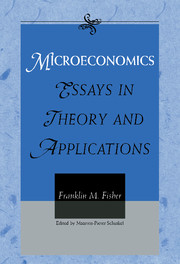Book contents
- Frontmatter
- Contents
- Introduction
- Part I Disequilibrium and Stability
- Part II Welfare Economics and Consumer Theory
- Part III Applications of Microeconomic Theory
- Part IV Industrial Organization, Economics, and the Law
- 24 Organizing Industrial Organization: Reflections on the Handbook of Industrial Organization (1991)
- 25 Reflections on Competition Policy (1993)
- 26 The Social Costs of Monopoly and Regulation: Posner Reconsidered (1985)
- 27 Due Diligence and the Demand for Electricity: A Cautionary Tale (1992)
- 28 Estimating the Effects of Display Bias in Computer Reservation Systems (1990)
- Part V Public Policy Applications
- Epilogue
- Indexes
25 - Reflections on Competition Policy (1993)
Published online by Cambridge University Press: 20 March 2010
- Frontmatter
- Contents
- Introduction
- Part I Disequilibrium and Stability
- Part II Welfare Economics and Consumer Theory
- Part III Applications of Microeconomic Theory
- Part IV Industrial Organization, Economics, and the Law
- 24 Organizing Industrial Organization: Reflections on the Handbook of Industrial Organization (1991)
- 25 Reflections on Competition Policy (1993)
- 26 The Social Costs of Monopoly and Regulation: Posner Reconsidered (1985)
- 27 Due Diligence and the Demand for Electricity: A Cautionary Tale (1992)
- 28 Estimating the Effects of Display Bias in Computer Reservation Systems (1990)
- Part V Public Policy Applications
- Epilogue
- Indexes
Summary
Introduction: Structure vs. Conduct
In writing on competition policy, I shall draw heavily on a century of American experience. I shall do so, not because that experience has been one of unmixed wisdom and success – far from it – but because that is the experience with which I am most familiar.
American antitrust policy (as American competition policy is called for historical reasons) is largely determined by judicial interpretation. In the American legal system, laws are expounded by judges given the nature of the case before them. This has been true of the antitrust laws (which one chief justice called “as broad as the Constitution”). But I do not plan to give a history of court cases; rather, I shall be asking how economic analysis can or should inform public policy, including legal standards.
The first issue in competition policy is a basic one. Should procompetitive laws be aimed at preventing certain forms of behavior or at preventing the development of certain kinds of market structures? This issue runs through the entire history of American antitrust policy and must inevitably be faced in any thoughtful policy formation.
The conduct vs. structure question is easy to exemplify. Suppose that a firm grows and acquires all or nearly all of the market, attaining monopoly power. If no single act performed by the firm is itself obviously anti-competitive, then a behavioral standard will allow this to happen. A structural standard, by contrast, proceeds from the view that monopolies are bad even though monopolists may be good people.
- Type
- Chapter
- Information
- MicroeconomicsEssays in Theory and Applications, pp. 384 - 403Publisher: Cambridge University PressPrint publication year: 1999



